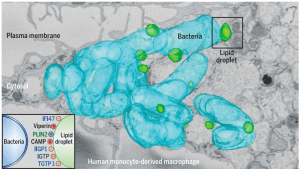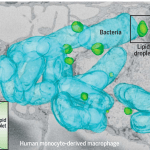
LDs mediate innate immune defence. Serial blockface scanning electron microscopy data reconstruction showing an infected macrophage. Bacteria (blue) and LDs (green) in the three-dimensional dataset have been coloured and projected onto a single image. LDs associate with the bacteria surface (black square). This interaction is proposed to bring a specific set of antipathogenic proteins in contact with the membrane-enclosing bacteria (inset). (source: Bosch et al., 2020 Science)
Lipid droplets, also known as lipid bodies, are cellular organelles that store and supply essential lipids required for signalling molecules, cell membrane building blocks and metabolic energy. In addition to storing lipids, the lipid droplets monolayer also contains proteins which may have a functional role. Besides having a role in cell metabolism, do these organelles play a role in immunity? Studies have shown that parasites, bacteria and viruses leverage lipid droplets as a source of nutrients to support infection. However, there is contrasting evidence that lipid droplets could play a role in innate immunity.
Researchers (Bosch et al.,) investigated the role of lipid droplets in innate immunity by utilising hepatic (liver) lipid droplets to study the role of these organelles in response to bacterial or lipopolysaccharide challenge. They measured lipid droplet size and co-localisation of lipid droplets and bacteria using (transmission electron microscopy and H&E staining) and utilised mass spectrometry to analyse proteome of lipid droplets in an in vivo lipopolysaccharide (LPS) challenge murine model. They demonstrated that mice treated with LPS had more lipid droplets than non-treated mice, and incubation with LPS-treated lipid droplets was associated with greater antimicrobial capacity that control-treated lipid droplets. They also showed that lipid droplets from LPS treated mice had extensive proteome remodelling and was associated with an increase in expression of anti-microbial products such as anti-parasitic IFN-g-inducible guanosine triphosphate (GTPases) and anti-viral viperin. They suggested that proteins expressed by lipid droplets could act individually, in a coordinated manner and/or synergistically to kill pathogens. They concluded that results presented in this study “highlight a potential role for lipid droplet in innate immunity by accumulating and delivering anti-microbial proteins to pathogens.
Journal Article: Bosch et al., 2020. Mammalian lipid droplets are innate immune hubs integrating cell metabolism and host defense .Science.
Summary by Cheleka AM Mpande
